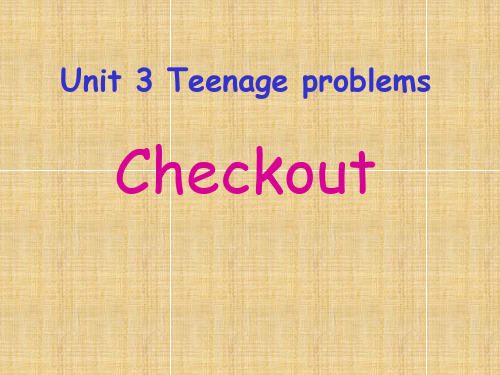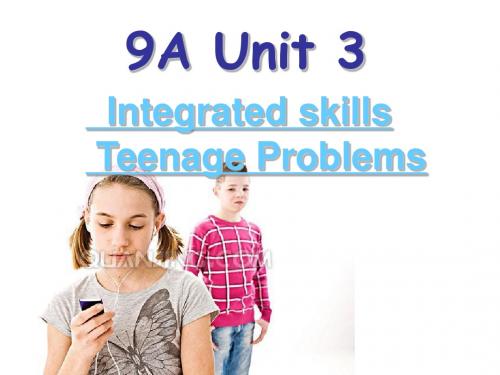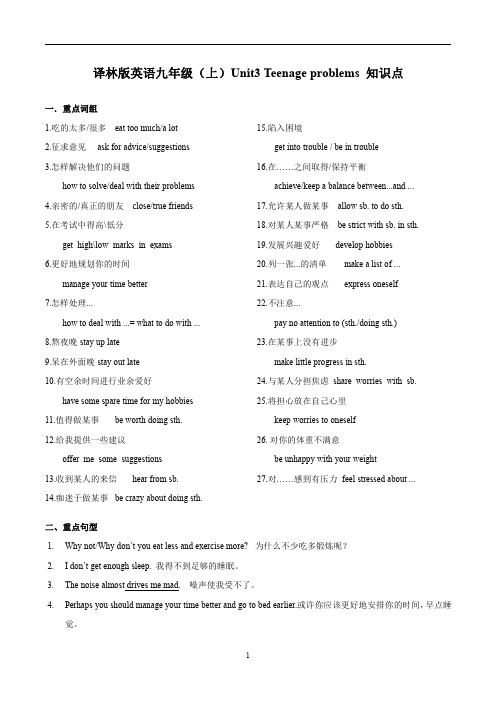【推荐K12】2018九年级英语上册Unit3Teenageproblems讲义新版牛津版
牛津译林版九年级上册Unit3《Teenageproblems》(reading1)说课稿

牛津译林版九年级上册Unit 3《Teenage problems》(Reading 1)说课稿一. 教材分析《牛津译林版九年级上册Unit 3 Teenage problems(Reading 1)》是一篇关于青少年问题的阅读文章。
文章主要讲述了一个青少年在成长过程中遇到的各种问题,如学习压力、与父母沟通、朋友之间的关系等。
通过这篇文章,学生可以了解到青少年成长过程中可能遇到的问题,并学会如何面对和解决这些问题。
二. 学情分析九年级的学生正处于青春期,他们面临着与文章中相似的问题。
因此,他们对这篇文章的主题会有共鸣,学习兴趣会比较浓厚。
然而,由于他们的英语水平不同,有的学生可能对文章中的一些词汇和语法结构理解起来有一定的困难。
三. 说教学目标1.知识目标:学生能理解文章的主要内容,掌握文章中的一些重要词汇和短语,如“pressure”、“communicate”、“relationship”等。
2.能力目标:学生能用英语简单描述青少年面临的问题,并学会如何解决这些问题。
3.情感目标:学生能认识到青少年时期的重要性,学会珍惜时光,积极面对生活中的困难。
四. 说教学重难点1.重点:学生能理解文章的主要内容,掌握文章中的一些重要词汇和短语。
2.难点:学生能用英语描述青少年面临的问题,并学会如何解决这些问题。
五. 说教学方法与手段1.教学方法:采用任务型教学法,让学生在完成任务的过程中,提高英语听说读写的能力。
2.教学手段:利用多媒体课件、图片、卡片等辅助教学,激发学生的学习兴趣。
六. 说教学过程1.Pre-reading:教师通过提问引导学生思考青少年时期可能遇到的问题,激发学生的学习兴趣。
2.While-reading:学生速读文章,回答相关问题;教师引导学生详细阅读文章,讨论文章中的细节。
3.Post-reading:学生分组讨论,用英语描述青少年面临的问题及解决方法;教师学生进行汇报,给予评价。
【配套K12】[学习]queAAA2018年秋九年级英语上册 Unit 3 Teenage prob
![【配套K12】[学习]queAAA2018年秋九年级英语上册 Unit 3 Teenage prob](https://img.taocdn.com/s3/m/a851f6c6551810a6f5248689.png)
Unit 3 Teenage problemsPeriod 1Comic strip & Welcome to the unit●1 too much 太多[观察] You eat too much. 你吃得太多。
Watching TV too much is bad for your eyes.电视看得太多对你的眼睛有害。
You are driving much too fast.你开车太快了。
There are too many rules in our school.我们学校有太多的规则。
[辨析] too much, much too与too many[一言辨析] The boy is much too fat because he eats too much meat and too many sweets every day.这个男孩太胖了,因为他每天吃太多的肉和太多的糖果。
1.(1)根据汉语意思完成句子不要吃太多的肉,否则你会变得太胖。
Don't eat __________ meat, or you'll get ________ fat.(2)单项选择2017·乌鲁木齐________ teenagers are becoming the “Headsdown Tribe”(低头族). It's ________ bad.A.Too many; much tooB.Too much; much tooC.Much too; too muchD.Too many; too much●2 perhaps adv. 或许,可能[观察] Perhaps you should give him another chance.或许你应该再给他一次机会。
[探究] perhaps常用于表示“某人(事)有可能但不肯定”,所表示的可能性大致对半。
九年级英语上册《Unit 3 Teenage problems Checkout》课件 牛津版

I think _i_t _h_el_p_f_u_l t_o_b_u_y__fa_t_h_e_r_a_b_irthday gift. (给父亲买一个生日礼物有帮助)
Translate the following sentences into English.
1. 把烦恼闷在心里对健康有害。
hobbies.
1. Mike’s problems:
He doesn’t know _w_h_e_n_t_o_t_a_lk__to__m_y_f_a_th_e_r_. _
(什么时间与父亲交谈)
He doesn’t knowh_o_w__to__m_a_k_e_h_i_m__in_t_e_re_s_te_d_ (怎样引起他的兴趣)
2. 实际上,我这个年龄的许多学生 经常感到压力。
3. 父母认为对孩子严格是有用的。 4. 他没有告诉我们怎样在考试中
取得高分。 5. 如果你不知道怎样在作业和爱好之
间取得平衡,你可以与朋友分享你的 问题。 6. 如果你对你的体重不满意, 为什么不花更多的时间运动呢?
Work as a youth worker!
Writing plan: 1.Introduction
2. Main body cause of stress and solution
3. Conclusion
You can correct a lot of your own mistake by checking your work.
When someone asks you how you can make you happy, yourself you may find that difficulty it to give a proper answer.
2018年牛津译林版九年级英语上册Unit 3《Teenage problems》(Integrated skills)课件

enough time He doesn’t have__________________ to do his homework.
I feel tired . I am so sleepy.
enough sleep He doesn’t have________________.
I’m so lonely
laugh at All her classmates _____________her.
I really enjoy eating. I’m fat but I hate exercising.
good at He is not _____________sports.
Do you have the same problems as these students? Can you share some with your classmates?
top students 4. She is one of the _______________in her class. What problems do you think Nora may have? 1. She is not very good at sports.
2. She doesn’t have many close friends
A1
Listen to the tape. Tick the correct information you hear about Nora.
Nora’s information a grade 9 student one of the top students love English, Maths and Chemistry always gets high marks in exams not very good at sports has many friends
译林版英语九年级(上)Unit 3 Teenage problems 知识点

译林版英语九年级(上)Unit3Teenage problems知识点一.重点词组1.吃的太多/很多eat too much/a lot2.征求意见ask for advice/suggestions3.怎样解决他们的问题how to solve/deal with their problems4.亲密的/真正的朋友close/true friends5.在考试中得高\低分get high\low marks in exams6.更好地规划你的时间manage your time better7.怎样处理...how to deal with...=what to do with...8.熬夜晚stay up late9.呆在外面晚stay out late10.有空余时间进行业余爱好have some spare time for my hobbies11.值得做某事be worth doing sth.12.给我提供一些建议offer me some suggestions13.收到某人的来信hear from sb.14.痴迷于做某事be crazy about doing sth.15.陷入困境get into trouble/be in trouble16.在……之间取得/保持平衡achieve/keep a balance between...and...17.允许某人做某事allow sb.to do sth.18.对某人某事严格be strict with sb.in sth.19.发展兴趣爱好develop hobbies20.列一张...的清单make a list of...21.表达自己的观点express oneself22.不注意...pay no attention to(sth./doing sth.) 23.在某事上没有进步make little progress in sth.24.与某人分担焦虑share worries with sb.25.将担心放在自己心里keep worries to oneself26.对你的体重不满意be unhappy with your weight27.对……感到有压力feel stressed about...二、重点句型1.Why not/Why don’t you eat less and exercise more?为什么不少吃多锻炼呢?2.I don’t get enough sleep.我得不到足够的睡眠。
2018年秋九年级英语上册Unit3TeenageproblemsPeriod5Integratedskills【word版】.doc

Unit 3 Teenage problemsPeriod 5Integrated skills & Study skills重点单词1.chemistry n. 化学2.bookworm n. 书虫,书呆子3.progress n. 进展,进步4.worried adj. 担心的,烦恼的5.aloud adv. 大声地;出声地6.pronounce vt. 发音7.correctly adv. 正确地8.pronunciation n. 发音9.mention vt. 提及;说起10.pronounce vt.—pronunciation n.11.correctly adv.—correct adj.重点短语1.a few几个2.laugh at嘲笑3.pay no attention to不在意4.what to do做什么5.tell sb to do sth告诉某人做某事6.go over复习;回顾7.make little progress几乎没有取得进步8.as often as possible尽可能经常地9.try to do sth尽力做某事10.don't mention it不客气11.make friends交朋友12.move to…移居到……重点句型1.I also told her to pay no attention to the classmates who laugh at her.我还告诉她不要在意嘲笑她的同学。
2.Now Nora seems much happier than before.现在诺拉似乎比以前快乐多了。
3.Perhaps you should go over what you've learnt as often as possible.也许你应该尽可能经常地复习你所学的东西。
公交小句1.Mo Yan is one of the most popular writers in the world.莫言是世界上最著名的作家之一。
牛津译林版九年级上册Unit3《Teenageproblems》说课稿5
牛津译林版九年级上册Unit 3《Teenage problems》说课稿5一. 教材分析《牛津译林版九年级上册Unit 3 Teenage problems》是一篇关于青少年问题的文章,主要讨论了青少年在成长过程中所面临的各种问题,如学业压力、与父母关系、交友问题等。
通过阅读文章,学生可以了解青少年阶段的困惑和挑战,并学会如何应对这些问题。
本节课的教学内容主要包括阅读理解、词汇学习、语法讲解和口语表达等方面。
二. 学情分析九年级的学生已经具备了一定的英语基础,能够进行简单的阅读、听力和口语交流。
然而,他们在阅读理解、词汇量和语法知识方面还存在一定的不足。
因此,在教学过程中,教师需要关注学生的个体差异,合理安排教学内容,调动学生的积极性,提高他们的英语水平。
三. 说教学目标1.知识目标:学生能够掌握文章中的关键词汇和短语,理解文章的主旨大意;2.能力目标:学生能够运用所学知识进行阅读理解,提高自己的英语阅读能力;3.情感目标:学生能够认识到青少年阶段的问题,学会正确面对和解决这些问题,培养健康的心理素质。
四. 说教学重难点1.重点:文章中的关键词汇和短语,以及阅读理解能力的培养;2.难点:文章的深层含义理解,以及如何运用所学知识解决实际问题。
五. 说教学方法与手段1.任务型教学法:通过设置各种任务,让学生在完成任务的过程中学习英语,提高他们的实践能力;2.情境教学法:创设真实的情境,让学生在实际情境中感受和运用英语;3.小组合作学习:鼓励学生之间进行合作交流,培养他们的团队意识和沟通能力;4.多媒体教学手段:利用多媒体课件、视频等资源,丰富教学内容,提高学生的学习兴趣。
六. 说教学过程1.导入:通过提问方式引导学生思考青少年阶段的问题,激发学生的学习兴趣;2.阅读理解:学生自主阅读文章,完成相关练习,教师进行讲解和指导;3.词汇学习:学生学习文章中的关键词汇和短语,教师进行讲解和举例;4.语法讲解:教师讲解文章中的语法知识,学生进行练习;5.口语表达:学生根据文章内容进行口语表达,教师进行评价和指导;6.总结与反思:学生总结所学内容,教师进行点评和鼓励。
九年级英语上册Unit3Teenageproblem
Differences in making friends or fitting in with peers can lead to feelings of loneliness and exclusion
Bullying
The experience of being bullied or bulling others can have long term psychological effects on teenagers
• Enhancing Social Skills: By addressing problems like social anxiety and peer pressure, teachers can develop better social skills and build meaningful relationships with others
Parents often fail to understand and communicate with their
young children, leading to misunderstandings and emotional
distance
02
Parenting style
Some parents may opt for an authoritative or permissive
• Improving Academic Performance: Addressing issues like stress and anxiety can help teenagers to better focus on their studies and improve their academic performance
【精选课件】2018年秋九年级英语上册Unit3TeenageproblemsPeriod2Reading导学课件新版牛津版.ppt
Period 2 Reading
Unit 3 Teenage problems
Period 2 Reading
课前自主预习 课堂互动探究
课前自主预习
1.除……外;只有___b_u_t ___ 单 2.几乎不__h_a_rd_ly___ 词 3.友谊_f_ri_en_d_s_h_ip_ 闯 4.清单___li_st____ 关 5.怀疑__d_o_u_b_t __
6.be crazy about _对__…_…_狂__热_______ 短
7.get into trouble __陷_入__麻_烦________ 语
8.worry about _____担_心________ 互
9.stay out late 在__外_面__待_到__很_晚_____ 译 10.hear from _收__到_…__…_的__来_信____
3.2016·襄阳 —Can you catch what the speaker is
saying,
Tina?
—Sorry. He speaks so fast that I can _B_____
understand
him.
A.nearly
B.hardly
C.probably D.exactly
out意为“拿出,取出”;set out意为“出发,动身”;look out意
为“当心”。故选A。
句型透视
●1 I have a lot of homework every day, and I have no choice but to do it. 每天我都有很多家庭作业,我别无选择,只能去做。 [探究] have no choice but to do sth意为“别无选择,只能做某 事”。
【配套K12】[学习]九年级英语上册 Unit 3 Teenage problems Period
Unit 3 Teenage problemsPeriod 2 Reading ⅠⅠ. 根据句意及汉语或首字母提示完成句子1. (2017·日照)I missed the last bus, so I had no c________ but to walk home.2. I am looking forward to h________ from all of you soon.3. Can you i________ making great progress in your study with no plan?4. (2016·天水)We think his suggestion is ________ (有价值的) to us.5. You will be paid a________ to the amount of work you do.Ⅱ. 根据句意,用所给词的正确形式填空1. The bear has no choice but ________ (lie) down in the cave in winter.2. (2017·常州)To complete the work, he drank some coffee to keep himself ________(wake).3. The book written by him is worth ________ (read).4. I think it's impossible for me ________ (finish) so much work in such a short time.5. Bob likes to stay out late ________ (play) with his friends.Ⅲ. 根据汉语意思完成句子1. (2017·常州)我想知道这个演讲是否值得一听。
- 1、下载文档前请自行甄别文档内容的完整性,平台不提供额外的编辑、内容补充、找答案等附加服务。
- 2、"仅部分预览"的文档,不可在线预览部分如存在完整性等问题,可反馈申请退款(可完整预览的文档不适用该条件!)。
- 3、如文档侵犯您的权益,请联系客服反馈,我们会尽快为您处理(人工客服工作时间:9:00-18:30)。
Unit 3 Teenage problems重难点精讲The TV is always on at my home.句中的on是副词,意思是“在进行着或处于工作状态中”。
I have a lot of homework every day, and I have no choice but to do it.句中的choice是“选择”的意思,have no choice but to是固定搭配,意思是“别无选择、只能……”。
题一:翻译:1.你不能开着灯就出门。
2.我别无选择,只好接受这个事实。
3.I have no choice but______.A. to give upB. giving upC. given upI often doubt whether it is worth spending so much time on homework.be worth (doing) sth.意思是“值得……”,后接V-ing或名词。
I dream of a long holiday so that I could have more time for my hobbies.dream of/about (doing) sth.意思是“梦想、想象”。
so that引导目的状语从句时,表示“以便、为了”从句中常使用can /could /may /might /will /would /should 等情态动词或助动词。
题二:翻译:1.这本书值得一读。
2.我一心想当一个老师。
3.我努力学习为了上一个好的高中。
What about choosing your hobby according to the time you have?according to一般可以引出表示原因或参考等的状语。
有“根据、按照”的意思。
Many students of our age have this problem.句中of our age是后置______,意思是“和……同龄的”。
题三:翻译:1.照我的表,现在是下午三点。
2.David经常和他同龄朋友在一起打篮球。
Thank you for telling me about your problems.thanks for的意思是“多亏、因……而感谢”。
thank you for 为某事感谢题四:翻译:1.谢谢你的理解。
2.谢谢你的聆听。
I often have to stay up late. Then I sometimes find it hard to stay awake the next day. stay up的意思是“不睡觉、熬夜”。
find it hard to do sth. 发现做某事很难。
题五:翻译:1.你经常很晚才睡觉吗?2.即使我一晚上不睡觉,我也要把作业做完。
(stay up all night)3.上个礼拜日,我生病了,但是第二天,我好多了。
4.我发现做饭真的很难耶。
语法讲解宾语从句的连接词连词that, if/whether 这三个连词在宾语从句中都不充当成分。
that没有任何意义,而whether/if有是否的意思。
连接代词:what,who,whom,whose,which连接代词在宾语从句充当主语、宾语或表语。
连接副词:when,where,how,why等。
连接副词在从句中充当状语。
题六:翻译:1.我不知道谁在楼上大声唱歌。
2.你能告诉我们你明天准备干什么吗?3.我不知道他是谁。
4.他没有告诉我什么时候我们能再见面。
5.你能告诉我怎么用这台新电脑吗?题七:能力提升与拓展Driving a car at a high speed along a highway seems to be fun. You only need to follow the bright traffic signs beside the highway and it will take you where you wish to go.But to a London taxi driver, driving is not an easy job. A taxi driver needs to have not only good driving skills but also a good knowle dge of the city of London, from the loneliest street to the popular restaurant around. He has to be at the se rvice of all kinds of passengers (乘客) at all times.A London taxi driver said the following about his job.During the night it is usual for him to stop two or three times for some food. He said, “I never drink when I’m working, otherwise I’d lose my license (驾驶执照).”He normally goes home between two and three o’clock in the morning. There are times he has to stay longer and try to make more runs. He said, “That’s the worst thing about working for yours elf. If you don’t make money, no one is going to give it to you. ”London taxi drivers not only “take”but also “give”. Every summer hundreds of poorchildren from London go for a day at the sea ― by taxi! There rides are paid by the taxi drivers. At the sea, they are met by the mayor (市长) , and a lunch party is also held for the taxi drivers and the children. After a happy day’s running around the beaches and visiting the market there, the children go home again by taxi, free of charge of course!1. London taxi drivers try to make more runs sometimes mainly because __________.A. they make a living by drivingB. they prefer to work f or themselvesC. they want to help more passengersD. they are used to working deep into the night2. How do London taxi drivers“give”?A. They give the poor children a lunch party at the sea each summerB. They give poor children the chance to meet the mayorC. They pay for some poor children’s rides for a day’s tour each summerD. They play with some poor children at the sea for a day each summer3. Which of the following words can be used to describe London taxi drivers?A. Brave and carefulB. Rich and generousC. Modest and easy-goingD. Hard-working and kind4. The passage is most likely to be foun d from __________.A. an advertisement of a taxi companyB. an online travel guideC. a website about the taxi drivers in LondonD. a report about living conditions in LondonUnit 3 Teenage problems题一:1.You can’t go out with the lights on.2.I have no choice but to accept the fact/truth.3.A题二:1.This book is worth reading.2.I dream of being a teacher.3.I studied hard so that I could enter a good senior high school. 题三:1.According to my watch, it’s three o’clock p.m.2.David often plays basketball with his friends of his age.题四:1.Thanks for your understanding.2.Thank you for your listening.题五:1.Do you always stay up so late like this?2.I will finish my homework even if I stay up all night.st Sunday I was ill but the next day I felt much better.4.I find it hard/difficult to cook.题六:1.I don’t know who is singing loudly upstairs.2.Could you tell us what you are going to do tomorrow?3.I don’t know who he is.4.He didn’t tell me when we could meet again.5.Can you tell me how to use this new computer?题七:1.A 2.C 3.D 4.C。
